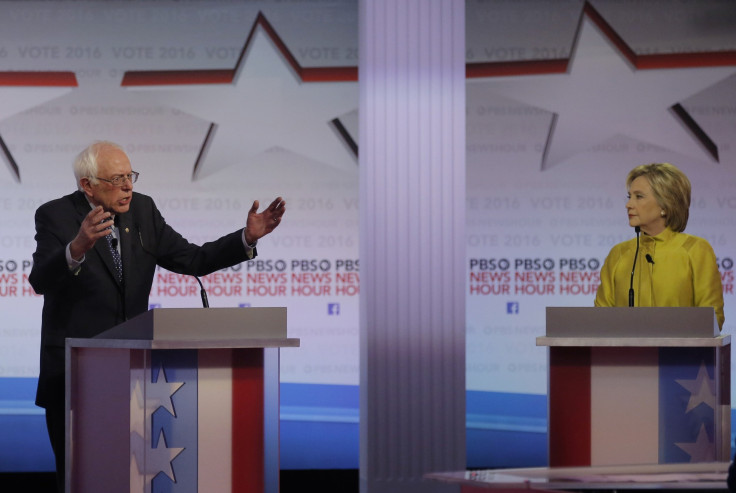Bernie Sanders, Hillary Clinton Focus On Race Relations, Criminal Justice In Sixth Debate As Democrats Battle Over Black Vote

Vermont Sen. Bernie Sanders and former Secretary of State Hillary Clinton both dug in to discuss criminal justice reform and race relations during the Democratic presidential debate Thursday night. After questions about race have been relatively few and far between in previous debates, the PBS “NewsHour” showdown featured the topic much more prominently, which makes sense as the two candidates are looking to appeal to minority voters ahead of the South Carolina and Nevada nominating contests later this month.
Particularly in South Carolina, many black voters are expected to turn out for the Democratic primary on Feb. 27, and Sanders and Clinton have been courting African Americans this week.
During the debate on Thursday, Sanders said he was tired of seeing videos of unarmed black men being killed by police officers and called for the demilitarization of police departments. He also criticized the rate of incarceration in the United States, which he pointed out is higher than most other countries in the world.
“At the end of my first term as president, we will not have more people in jail than any other country,” Sanders said.
Clinton broadened the discussion to include other issues she said needed to be addressed to help black communities across the country. “We also have to talk about jobs, education, housing and other ways of helping communities,” Clinton said.
Maria Hamilton, mother of Dontre Hamilton, is @HillaryClinton's guest at the #DemDebate in Milwaukee tonight. #ImWithHer
— Lauren Peterson (@lcollinsp) February 12, 2016
In a shout-out to Milwaukee, where the debate was taking place, she also specifically mentioned Dantre Hamilton, a 31-year-old who was shot 14 times by a Milwaukee police officer in April 2015 and whose death sparked protests in the city. Milwaukee is the worst place in the country for African Americans to live, CityLab reported in October.
“We are seeing the dark side of the remaining systemic racism that we have to root out in our society,” Clinton added. “I think President Obama has set a great example … We have to build on an honest conversation about where we go next.”
Sanders agreed with Clinton on the issue of needing to address systematic racism, but he then also pivoted to focus on his normal area of economic issues.
“The African-American community lost half of their wealth as the result of the Wall Street crash,” Sanders said.
Thursday night’s debate marked the first meeting for Clinton and Sanders since Clinton’s enormous loss in the New Hampshire primary on Tuesday. The PBS showdown also came as the former secretary of state was in the process of refocusing her campaign’s message, strategy and fundraising.
While Clinton entered the race last summer as the Democratic Party’s prohibitive favorite for the nomination, the enthusiasm around Sanders’s candidacy has created a significant challenge for her in recent weeks. After just barely beating the Vermont senator in the Iowa caucuses last week, Clinton’s defeat in New Hampshire has put even more pressure on her to do well in the next two nominating contests in Nevada and South Carolina.
In preparation for those states, which have significantly more diverse electorates than Iowa or New Hampshire, both Clinton and Sanders ramped up their efforts to win over black voters this week. Clinton is thought to have a large advantage with people of color and typically leads Sanders among African Americans in polling, but Sanders has continued to surprise her and is likely hoping his momentum from New Hampshire can help convince black voters that he is a viable option. The two campaigns have each recruited endorsements from high profile African American leaders and have spent time talking about their commitment to addressing issues such as criminal justice reform, police violence and mass incarceration.
Another issue for Clinton could come in the form of a renewed focus on controversies from her time as secretary of state, and particularly the private email server she used while in office. A federal judge ordered the State Department on Thursday to release another four batches of her emails before the end of February, which stretches the releases out over both the Nevada caucuses Feb. 20 and the South Carolina primary Feb. 27.
Before Thursday’s debate, Clinton held her national lead over Sanders, polling at an average of 49.3 percent to Sanders’s 36 percent, according to Real Clear Politics. She has often delivered strong debate performances, and so was expected to make the most of her tough position to bounce back from a tough week.
© Copyright IBTimes 2024. All rights reserved.






















